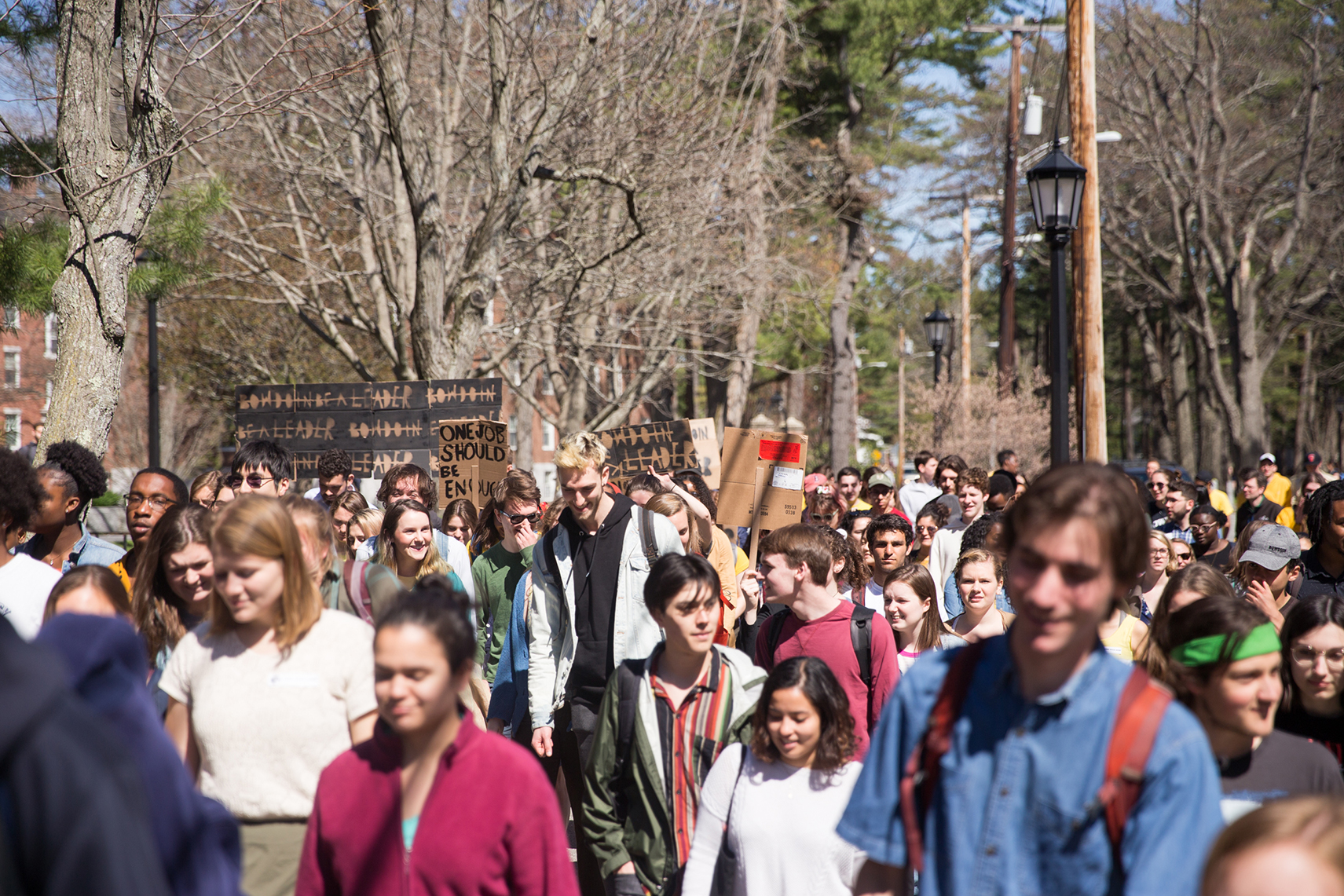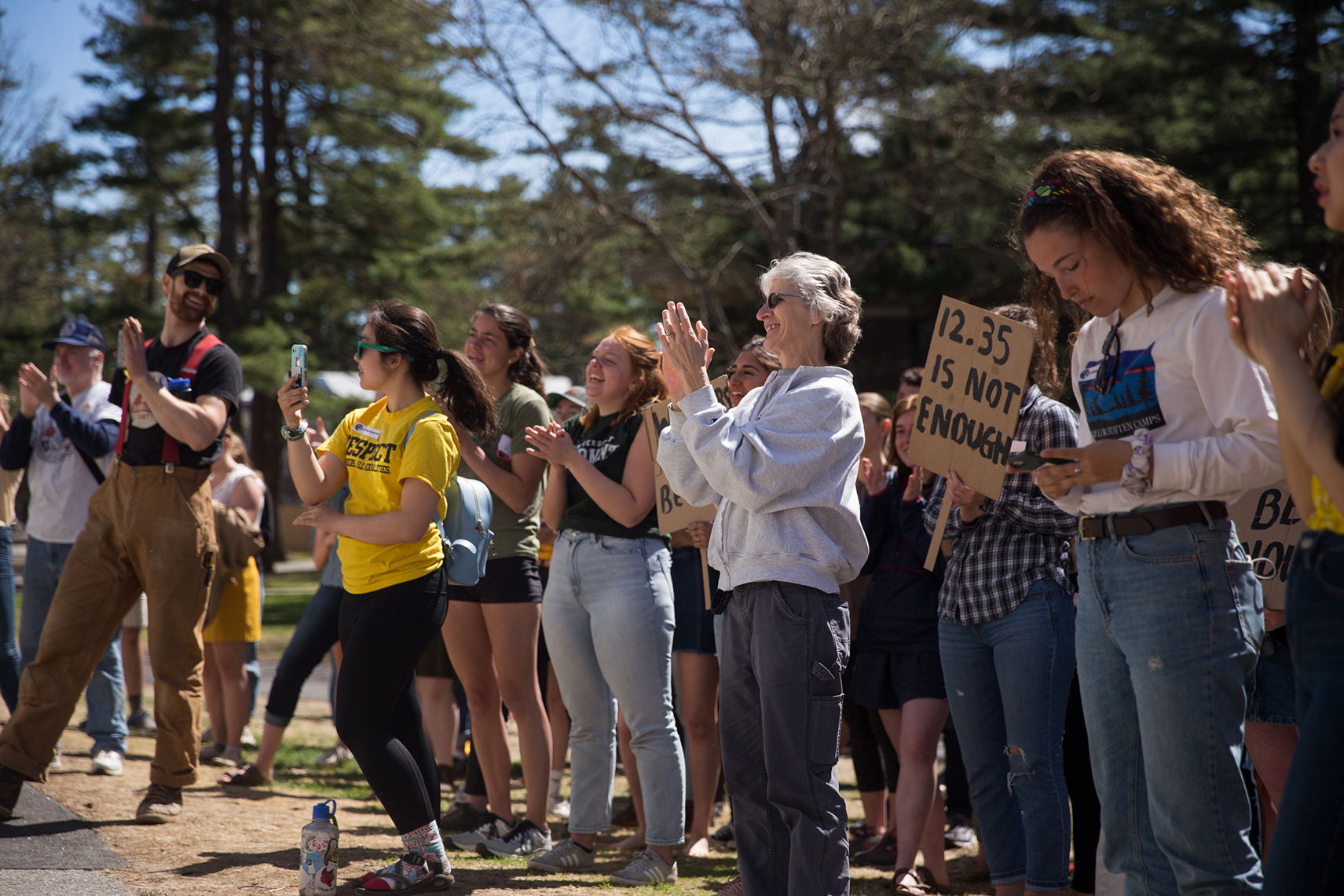A win for Bowdoin’s workers? Campus reacts to wage hike
October 25, 2019
The College will spend an additional $1.6 million annually to increase wages for benefits-eligible hourly employees beginning July 2022.
As President Clayton Rose announced in an email to the campus community on Monday, this will cover both an increase in wages for workers who currently make less than $17 an hour, which will be the College’s new minimum starting wage for hourly benefits-eligible employees, up from the current starting wage of $12.65. For employees who currently make more than $17 an hour, their wages will be increased proportionally.
In an interview with the Orient, Rose explained the rationale behind the decision.
“We did this because it’s the right thing to do for our employees in the context of the realities of the labor market, and [out of] a desire to remain a leader in the state and in the region,” he said.
He added that this was a logical step for the College and was the product of a regular review of compensation and benefits completed by Senior Vice President for Finance and Administration and Treasurer Matt Orlando.
Housekeepers, a subset of the College’s hourly workers whose wages have been the subject of scrutiny and contention by student activists, had much to say regarding the wage increase. Sherry Cousins, a long-time Bowdoin housekeeper, said she was satisfied with what the raise represented.
“I think we are headed in the right direction of fixing what is broken and making a better future for the newcomers,” she said in a meeting with members of Bowdoin Student Government (BSG).
However, she added that she was worried about what it meant for her, a veteran of the housekeeping department who already makes more than the entry wage for Bowdoin housekeepers.
Sandy Green, a housekeeper at Bowdoin for 11 years, told the Orient in a phone interview that she was disappointed with the timetable of the wage increases.
“When I read that email from President Rose, I almost walked out and quit,” she said. “I think it’s just to keep us quiet … This is what they did to us last July. It’s three years until it’s $17 dollars.”
Members of the Bowdoin Labor Alliance (BLA), a student group that has organized protests, demonstrations of student support and a rally around the issue of a living wage for College employees, reacted to Rose’s email with trepidation.
Diego Grossmann ’20, a leader of BLA, expressed uncertainty as to whether the wage hike will still be enough by the time it is actually implemented.
“What students, workers and community members are asking for is for Bowdoin to catch up with the bare minimum,” he said. “What is the ‘living wage’ if not that?”
Benjamin Ray ’20 who leads BLA with Grossmann, agreed.
“Seventeen dollars an hour, three years from now, is not a living wage.”
According to Bowdoin’s frequently asked questions page about housekeeper compensation, the College does not use a living wage philosophy in determining the wages it pays its employees.
The page defines a living wage framework as: “[a] program that is structured to pay different wages for the same job based on at least thirteen different personal circumstance categories (e.g., one adult; one adult with one child [etc …]).”
The page further explains that Bowdoin uses an “equal pay for equal work” philosophy instead, meaning that two people who hold the same job will receive the same wage regardless of family situation.
Rose stressed that the decision to raise wages was not prompted by student activism.
“If this were some sort of response to the noise, we would have gone to $15 [per hour] and be done with it,” he said. “That is not what we’re doing. This is a much more comprehensive, thoughtful and appropriate program for employees.”
Ray said that the BLA was proud of its efforts.
“I know this wouldn’t have happened two years ago,” he said. “I don’t think there was a base of students willing to push hard for our community, to make things better around here, as it affects wages and working conditions around campus, until the BLA was able to organize that.”
BSG President Ural Mishra ’20 said that he was happy with the new $17 minimum wage, as opposed to the $15 minimum wage floated by student activists.
“I never thought 15 was enough, so seeing it higher than 15 is a great thing,” he said.
“To be perfectly honest, I don’t think the BSG has done a whole lot,” added Mishra, when asked about BSG’s involvement in the decision. “I think Arein [Nguyen ’21, BSG vice president] and I especially have tried to do our part to push senior [administrators] to think about this whole process from the eyes of the housekeepers and the students, but a lot of the leg work was done by the students, who for the past few years have stood by these housekeepers.”
In Monday’s email, President Rose noted that the College reviews its compensation program regularly, and reserves the right to adjust the program when warranted. For instance, a scheduled raise for faculty and staff was frozen between 2009 and 2011, following the 2008 financial crash. This is the only modern precedent for such a change to compensation.
However, the vast majority of hourly workers’ pay remained unaffected, as the salary freeze did not affect staff earning under $40,000 a year. In 2011, the frozen raises were applied retroactively to all employees.
The details about the proportional wage increases, as well as information about budget restructuring to finance the raise, will be announced as the Board of Trustees continues to determine the budget for the next fiscal year.
The new minimum wage will not apply to “casual” employees, or to those who work fewer than 20 hours a week. According to Orlando, the College has “absolutely no plans to add casual employee hours” to the proposed budget beyond usual fluctuations, ensuring that current full-time workers will not be reclassified to part-time in order to offset the cost of the rising wages.
While the total number of casual employees has remained steady in recent years, given that many of the casual employees only work at Bowdoin for a short time—sometimes only for a single event—the number of casual employees at the College varies significantly throughout the year.
“The fluctuation from year to year is largely dependent on the many programs the College offers to the local and broader communities as well as the volume of special events we run,” Orlando wrote in an email to the Orient.
Addressing the question of inflation, Orlando explained that the $1.6 million estimate does not include the money that is allocated to the regular staff increase pool, which is determined based on factors that include the competitive market and inflation.
Although BLA contends that the group’s activism on campus is far from over, Ray is happy with what the campaign for a living wage has already accomplished.
“I think this campus is fired up in a way it hasn’t been in a long time, and we’re at a point in our world where we need that more than ever,” said Ray.
Reuben Schafir contributed to this report.
Comments
Before submitting a comment, please review our comment policy. Some key points from the policy:
- No hate speech, profanity, disrespectful or threatening comments.
- No personal attacks on reporters.
- Comments must be under 200 words.
- You are strongly encouraged to use a real name or identifier ("Class of '92").
- Any comments made with an email address that does not belong to you will get removed.



***Sandy Green, a housekeeper at Bowdoin for 11 years, told the Orient in a phone interview that she was disappointed with the timetable of the wage increases. “When I read that email from President Rose, I almost walked out and quit,” she said. “I think it’s just to keep us quiet … This is what they did to us last July. It’s three years until it’s $17 dollars.”***
Jeez, Sandy. Wages just went up by over 30%. Your case is becoming less endearing with every interview you give.
***“Seventeen dollars an hour, three years from now, is not a living wage.”***
What evidence do you have for this claim, Ray and Grossman? According to livingwage.mit.edu, a living wage for a single adult without children in Maine is $11.91. On the other end, if you have two working adults and two children, the living wage is $15.90. On the new wage, two housekeepers who wanted to raise two children would be making, at minimum, 7% more than the living wage. A single housekeeper would be making, at minimum, 43% more than the living wage. Inflation is below 2%. Do the math, boys.
***“To be perfectly honest, I don’t think the BSG has done a whole lot,” added Mishra, when asked about BSG’s involvement in the decision.***
No kidding, Ural. When has the BSG done “a whole lot” for anyone?
Lasarte and McKay leave out of their reporting a crucial detail in Rose’s announcement: that the College will cut other areas of Bowdoin’s annual budget to find the $1.6 million for the wage increase. I have a few ideas. And what’s with the question mark in the title? How could a large wage increase be anything but a win?
A shame. Other jobs can be found for $15 starting, or they can join a union at MSAD75 and folks can do even better. Bowdoin will lose good people. $17 in three years is a failure. Sandy, keep your voice in the mix!